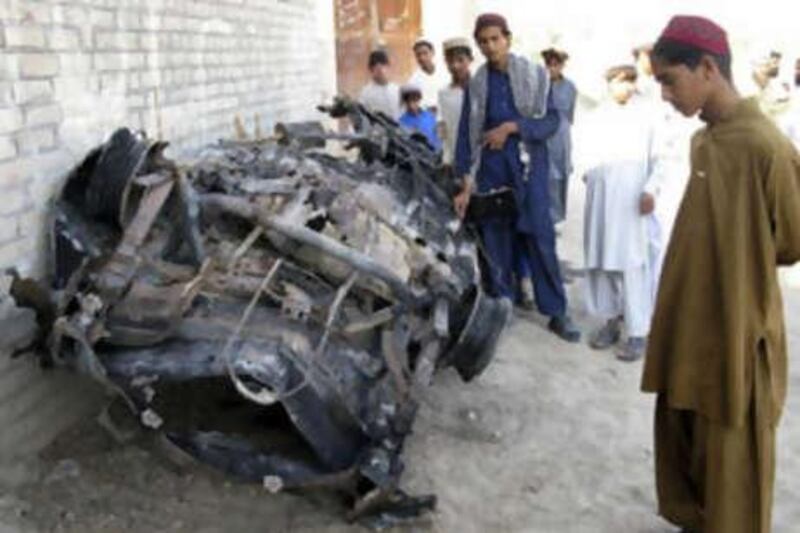Missiles believed to have been fired by remotely piloted American aircraft slammed into two villages close to the Afghan border on Friday, killing 29 people, including an operative with al Qa'eda and other foreign militants, intelligence officials said. An Egyptian al Qa'eda operative described by the United States as the terror network's propaganda chief was killed, according to security officials. Abu Jihad al Masri was among several rebels killed when two missiles fired by a suspected US spy drone hit a lorry in the North Waziristan tribal region bordering Afghanistan last night, they said. The United States has offered a one-million-dollar bounty for the death or capture of Masri, who has appeared in an anti-Western video introduced by Ayman al Zawahiri, Osama bin Laden's number two.
"The strike was aimed at a vehicle carrying Abu Jihad and two others. The target was successfully hit and all three people were killed," a senior Pakistani security official told AFP on condition of anonymity. His death came in one of two separate missile attacks in Pakistan's troubled tribal belt yesterday, the latest in a series of 18 strikes in the past three months that have raised tensions between Washington and Islamabad.
The attacks also come just days before the US presidential election, in which the "war on terror" in Afghanistan and, increasingly, Pakistan has been a key foreign policy issue. There was no immediate confirmation from the Pakistani military or from US forces deployed in Afghanistan about Masri's death. The US state department's Rewards for Justice website said that the balding Masri "is in charge of al Qa'eda media and propaganda. He may also be the chief of external operations for al Qa'eda".
It said that he was believed to operate out of Iran, but Pakistani officials said that he was known to have moved to the Pakistani tribal belt in 2005 or 2006. It said he also went by the alias Mohammad Hasan Khalil al Hakim.
The video was released by As Sahab, al Qa'eda's media arm. Later that year Mr Masri issued a website statement calling Pope Benedict XVI a "spiteful crusader" after the pontiff made remarks on Islam and violence, according to the SITE Intelligence Group, a US organisation that monitors Islamist websites. Militant sources in Pakistan said Mr Masri was primarily involved in "ideology" and not so much with al Qa'eda's operational side.
The last al Qa'eda figure on the US state department list to be killed in a missile strike was the chemical weapons expert Midhat Mursi al Sayyid Umar, who died in July in the South Waziristan tribal region. South Waziristan was the scene of the second of yesterday's strikes. Hours after the one that killed Mr Masri, missiles targeted a tribesman's house outside Wana, the main town in South Waziristan, killing 12 militants and injuring 30 others.
Among those wounded was Mullah Nazir, a top Pakistani Taliban commander accused of engineering attacks on international forces deployed in Afghanistan, officials said. Security officials said that Abu Akash, an Arab al Qa'eda militant reported to have been killed in the first missile attack, now appeared to have escaped safely. Pakistan's foreign ministry said on Wednesday that it called in the US envoy Anne Patterson over the recent series of strikes.
A report last month said Pakistan's national security adviser Mahmud Ali Durrani made an unannounced visit to protest to top White House officials after a US commando raid in early September led to civilian casualties. *AFP





